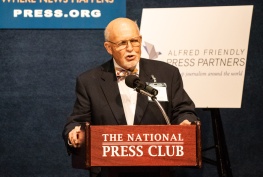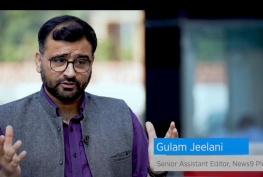
The 10 Alfred Friendly Fellows, gathered during a break at the IRE conference in Denver, gave positive reviews of the experience
Ten members of the 2022 class of Alfred Friendly Press Partners fellows learned the latest tools and techniques for innovative journalism at the Investigative Reporters and Editors annual training conference in Denver. The IRE conference in June brought together more than 1,200 journalists from various newsrooms in the U.S. and overseas along with freelancers and educators. The fellows were glad to be reunited for a long weekend, and shared their perspectives on the importance of the training, along with the networking and friendships the conference fostered.
Anastasia Valeeva, Alfred Friendly Fellow from Russia working with The Marshall Project:
The sessions I attended were mostly on data and my current beat, criminal justice, which included police accountability, gun violence and working with public records. My favorite session would probably be ‘Creative problem-solving for DIY datasets’, where reporters showed a behind-the-scenes walkthrough of collecting the missing data on topics such as civilian casualties in Iraq or political views of incarcerated people. It was powerful, inspiring and moving.
Also, I attended the mentor breakfast – an amazing event. My mentor, Sandra Fish, an experienced data reporter from Colorado Sun, provided many valuable suggestions and feedback to my current questions. Overall, the word ‘mentor’ was brought up at so many sessions during the conference, that it made me realize just how much mentorship, friendship and supporting networks are valuable in the U.S. journalism industry.
Somesh Jha, OCCRP Fellow from India working with the Los Angeles Times
The conference was a treasure of hidden gems I had always wanted to discover being an investigative journalist for the past nine years. I learned how to make investigative scripts sing by following a simple trick: put the power of the sentence at the end. It was insightful to be aware of the fact that algorithms are not just complex formulas, but can often be systems intentionally designed by humans to mask discriminatory practices. It is possible to hold even the algorithms to account by probing what inputs went into the making of it.
Learning through osmosis by just being in the presence of the best minds of the investigative journalism fraternity is an experience I will carry on for the rest of my career, with the hope that it will make me a better journalist every day.

Paul Radu (center), an Alfred Friendly alum and co-founder of OCCRP, met with the Fellows at the IRE conference
Saurav Rahman, OCCRP Fellow from Bangladesh working with Kansas City Public Television
“I’m also an Alfred Friendly fellow; I’m sure, it will be a life-changing experience for you.” This is what Paul Radu told us after I introduced myself to him at the luncheon for international participants of the IRE conference.
He is the director of the Organized Crime and Corruption Reporting Project (OCCRP) and participated in the Alfred Friendly fellowship in 2001. During the program, Radu worked as an intern at the San Antonio Express-News, where he first encountered computer-assisted reporting.
“That time I learned the importance of data and technology in journalism, which led me to shape up my investigative reporting along with all the initiatives I have taken further,” Radu said. “So, all the technological approaches you see now in OCCRP, like Investigate Dashboard or Aleph, are rooted in the Friendly fellowship.”
Apart from plenty of discussions, the main attraction of the conference was the hands-on training and master classes. As an economic journalist, I have been practicing computer-assisted reporting for a long time. However, it was limited to the basics of Excel formulas. This IRE conference taught me the magic of Excel, e.g. sorting, filtering, and pivot tables. Apart from formulas and functions of Google Sheets, these master classes taught me how to import, scrape, and clean up data.
Gagandeep Singh, OCCRP fellow from India, Pittsburgh Post-Gazette
My favorite sessions were about the U.S. gun industry and violence, conducted by the Trace Foundation. It delivered shocking facts, including that nearly 111 people die every day due to gun violence. The sessions also put light on inspection reports and violations by the gun store owners. It would certainly help me once I go back home; I will also check inspection reports of the gun stores in my state, Punjab, because I am pretty sure that there would be numerous violations by the gun store owners there too. Similarly, the sessions of the human trafficking was also productive and I will correlate with the human trafficking in Punjab too.
Chencho Dema, OCCRP fellow, KCUR, an NPR affiliate in Kansas City
One of the best sessions was about interviewing vulnerable sources. It is often difficult to conduct interviews with some sources, especially vulnerable ones. In Bhutan, I never had any special training on how to interview vulnerable sources, but now I feel confident enough to do so. When I covered crime, justice, and corruption cases, I didn’t interview the victims and instead consulted the reports compiled by the authorities. I acquired secondary information, not because I was afraid to talk to them, but because I was not sure what kind of questions to ask in sensitive circumstances. I was not sure if they wanted to be interviewed or how they would react when I introduced myself as a journalist. Because of this, I was not able to write a complete story. After this session, I have gained the confidence and skills to conduct interviews with sources in a variety of vulnerable situations.
Indunil Usgoda Arachchi, OCCRP fellow from Sri Lanka, InvestigateWest
The most interesting session for me was from the Public Records Track. Those sessions brought out many databases, and many story ideas too. Video production for print, digital and audio folks was also among the best sessions.
The IRE Mentorship Networking program was also great. My mentor was Zack Newman KUSA-TV. It was a good opportunity to discuss my journalism career and get advice from him.
Jody Garcia, Alfred Friendly fellow from Guatemala, the Miami Herald
A data journalism workshop inspired me to find new ways to investigate and analyze information. I also had the opportunity to meet editors interested in learning more about the situation in Guatemala and Central America. Thanks to this conference I also met again with the other fellows in this program, people whom I greatly admire and respect.
Tanka Dhakal, OCCRP Fellow from Nepal, Wisconsin Center for Investigative Journalism
IRE22 will definitely be one of the major influential events in my journalism career. Being able to witness celebrations of ground breaking journalistic works and journalists was a highlight for me. My favorite sessions were reporting on trauma, how to be edited, finding investigative stories in environmental beats, reporting about diversity, and international collaborations.
To help Alfred Friendly Fellows in the Class of 2023 experience innovative training, please donate to our nonprofit organization through this link. Your donation helps Alfred Friendly conduct fellowship programs in the United States for young journalists from countries where press freedom has the potential to grow.





